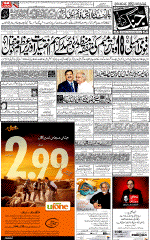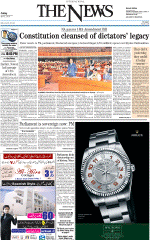Adil Najam


Dear Readers,
While All Things Pakistan has remained alive and online, it has been dormant since June 11, 2011 - when, on the blog's 5th anniversary, we decided that it was time to move on. We have been heartened by your messages and the fact that a steady traffic has continued to enjoy the archived content on ATP. While the blog itself will remain dormant, we are now beginning to add occasional (but infrequent) new material by the original authors of the blog, mostly to archive what they may now publish elsewhere. We will also be updating older posts to make sure that new readers who stumble onto this site still find it useful.
We hope you will continue to find ATP a useful venue to reflect upon and express your Pakistaniat. - Editors
RELATED POSTS
- 18th Amendment: What Does It Say?
- Higher Education in Pakistan: Future Tense
- New Provinces in Punjab and Beyond: Why Not?
- ATP Poll: Judiciary vs. Government – Good, Bad, or Outright Ugly?
- Grading Our Leaders: Some Surprising Poll Results
ATP Discussions
Most Commented
- Pakistani University Rankings (984)
- Dr. Abdus Salam: Beyond Physics (483)
- Nominating Abdul Sattar Edhi for a Nobel Award: Give Us Your Testimonials (424)
- Selling Your Kidney in Pakistan (418)
- 'Operation Silence' Against Lal Masjid Islamabad (362)
- Benazir Bhutto Assassinated (354)
- Pakistan Cracks Down on TV News Channels Geo and Aaj (346)
- The Lal Masjid Assault on Islamabad (329)
- Facebook Fiasco: What Would Muhammad (PBUH) Do? (311)
- Celebrate the Spirit of Sacrifice. Spare the Animals. (310)























































What if both the state and the people made no distinction between faiths, values and practices? Is that a secular state?
What if both the state and the people imposed no compulsion for any faith, values and practices? Is that a secular state?
What if both the state and the people did not create consternation for any to practice any faith, values and practices? Is that a secular state?
What if both the state and the people allowed people to freely leave a faith if they so choose to? Is that a secular state?
@Watan Aziz
As a most curious person , you have further elaborated eleven questions, many of them are the same type as that of the other five on which I have already expressed by opinion. I can not add any thing more.
Certainly, you have some wiser friends to help, even better, you can use your own intelligent mind to find the response.
You have used your curiosity so far, what about using your brain for the answer to your own riddles?
AHsn Strasbourg
@readinglord
The definition is not mine, it is simply a dictionary definition. The same can be done for the definition of religion. It is true the any religion is based on faith. It is divine no matter whatever the definition of divine. The logic and reason do not effect Faith and it is an independent entity. The reason and logic is man made.
Scientific facts are the results of man’s observation and experimentation and based on logic and reason. These facts are temporal and variable in space, whereas any religious dogma based on faith is considered Eternal and Universal.
In simple words the Science (or any man made –ism) and the Religion are two independent entities.
These two entities reside side by side in the human brain. The idea that reason and logic come from and brain and feeling, sentiments and faith emanate from heart is an utter nonsense according to present knowledge.
A heart is a pumping machine. The natural heart can be disconnected and in its place a man made machine can be inserted, but the patient will keep on praying to the same god and keep on loving the same wife/husband.. The same will happen even when in place man made machine another natural heart is used.
Iqbal’s message was perhaps correct when he wrote it but now it is obsolete. I am talking of the message and not of the poetry. The beauty of a verse is how it is written and how the message is expressed. The beauty is beyond reason and logic.
AHsn Strasbourg
@Ahsn
Well done dear! You have defined ‘secularism’ so succinctly and comprehensively. But unless we define religion the definition of secularism remains ambiguous. For instance, if we define religion simply as ‘faith’ than secularism can also be taken as a faith of ‘not having any faith’ and so on. Logic and reason leads us nowhere. As Iqbal had said:
“Aql charagh-e- raah he manzil nahein he”
What have you people to say in this respect?
What is a state imposed speed limits near a place of worship? Is that a secular state?
What if a state places restrictions on how the believers can be called for services? What if the restrictions are not imposed on majority but the minority? Is that a secular state?
What is a state imposes limits on hours of business on days of worship and around the hours of worship? Is that a secular state?
What if a state prohibits certain items to be sold near a place of worship, prohibiting sale of liquor or other items, otherwise not contraband? Is that a secular state?
What if a state prohibits certain kinds of business from conducting business near a house of worship, not otherwise contraband? Is that a secular state?
What if a state allows believers to work in state offices while wearing religious symbols and religious garments? Is that a secular state?
What if we can discuss what is a secular state but without the “but ifs”?
What if we honestly discuss and agree that while the concept it great, the practice has it’s own interpretations, versions, norms and conventions from state to state, region to region, faith to faith?
What if we find that the classic definition of a “secular state” does not exist in practice anywhere, except in books, rhetorics and rote repetition?
What if we try not to beat other people up and insult their intelligence with these labels while creating a set of caveats, circumstances and other explanations for ourselves?
What if we simply try to create a better world with better understandings with peoples and their faiths and not try to tie them down with labels that imply ‘we are better than you are’?
Most curious?